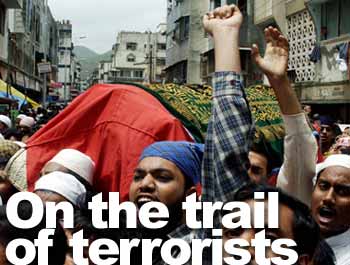 | « Back to article | Print this article |

There are many layers to the sensational story of Ishrat Raza Jahan, the young collegian from Mumbai who was shot dead in an encounter with the crime branch of the Gujarat police in Ahmedabad last month along with some suspected terrorists of the Lashkar-e-Tayiba.
The tragic reality is that Ishrat was but an insignificant target of the intelligence operation mounted jointly by the Gujarat police and the Intelligence Bureau. Journalist Praveen Swami has exposed the details in a series in The Hindu, one of India's most respected newspapers, and these have not been denied by the authorities.
Here, we reconstruct the police anti-terrorist operation, the like of which is not very common in India outside of Jammu and Kashmir.
THE telephone of a lawyer living in the Muslim-dominated Juhapura area of Ahmedabad was tapped last year after the Intelligence Bureau received a tip-off. That the lawyer was acting as a Lashkar-e-Tayiba contact in Gujarat was revealed by accident to the Jammu and Kashmir police in February 2004 when they killed a terrorist, Ehsan Illahi, in an operation. The Jammu and Kashmir police found a letter on Illahi written by a man named Haji Sadiq Ahmed, a Kashmiri criminal arrested in connection with the murder of former Gujarat home minister Haren Pandya.
Sadiq Ahmed is still lodged in the Sabarmati jail in Ahmedabad. Along with other important information, his letter revealed the crucial link of the lawyer from Juhapura.
After getting enough material on hand against the lawyer, the police persuaded him to double-cross the Lashkar. The lawyer had no choice but to co-operate when confronted with the evidence against him.
The operation that ended on June 15 with the killing of Ishrat Jahan and three other alleged terrorists thus began in March 2004.
THE lawyer, who cannot be named, was being instructed by Muzammil, a Lashkar-e-Tayiba operative based in West Asia. Slowly, the police learnt that Muzammil was the man who was masterminding a plot to kill Lal Kishenchand Advani, then deputy prime minister of India. Of course, till the time the June 15 encounter took place, Muzammil himself remained unaware that his contact's telephone in Ahmedabad was being tapped and the lawyer himself was practically under house arrest.
Muzammil was also the mentor of Javed Sheikh from Pune, who was killed along with Ishrat Jahan. Once they were ready and told to reach Ahmedabad, Muzammil instructed the lawyer to arrange the logistics for the two Pakistanis who were also killed in the encounter.
Zeeshan Johar alias Janbaaz hailed from Gujranwala in West Punjab and Amjad Ali Rana alias Salim alias Bunty alias Rajkumar was from Sargodha. Both were hard-core members of the Lashkar-e-Tayiba and their identities were known to the police in Jammu and Kashmir.
Javed Ishrat, the two Pakistanis, the Ahmedabad lawyer, and Muzammil used coded language in all their communications on telephone and by e-mail. The telephone tapes and Ishrat's diary revealed these codes. According to these, Advani was 'Lala', Gujarat Chief Minister Narendra Modi was 'Mubarak', Vishwa Hindu Parishad Secretary General Dr Pravin Togadia was 'Tinku', Shiv Sena leader Bal Thackeray was 'Kutta', Uttar Pradesh BJP president Vinay Katiyar was 'Kanta' and Madhya Pradesh Chief Minister Uma Bharti was 'Behenji'. Delhi was 'Maika' and Ahmedabad, 'Sasural.'
They wanted to kill these leaders because they viewed them as enemies of Islam.
The two Pakistanis were smuggled into India from across the Bandipura border in Jammu and Kashmir. They were linked to Muzaffarabad-based terrorist Zaki-ur-Rehman who heads the Lashkar's operations in the state.
LITTLE did Javed and Ishrat, or the others, know that they were being watched closely as they went about preparing for their terrorist acts. The couple and the Pakistanis are said to have travelled to many places, including Lucknow, Ibrahimpur, and Faizabad in Uttar Pradesh.
On March 29, 2004, Javed went to Muscat using his old passport, which bore his original Hindu name Pranesh Kumar Pillai. He returned from Oman on April 11, 2004, with a 'matrix sheet', codenames, and a Thuraya satellite phone from Muzammil.
Some of Muzammil's communications with these operatives in India revealed their intentions. Muzammil said Advani was responsible for the demolition of the Babri Masjid on December 6, 1992 and deserved to die.
If the Bharatiya Janata Party had not lost the general election in May, Advani was to have come back to Ahmedabad to thank the voters of Gujarat. Muzammil's plan was to hit the senior BJP leader in his victory procession after the election results.
But the terrorists had reckoned without the voters. The fall of the National Democratic Alliance government and the BJP's lacklustre result in Gujarat, where it lost as many as 12 of the 26 Lok Sabha seats to its rival, the Congress, proved fortuitous for Advani. He dropped his plan for a victory rally.
MUZAMMIL was furious.
He was told by Javed and the Pakistanis: "Lala ka business chaupat ho gaya hai. Woh ab jaldi se sasural mein aaye aisa nahin lagta hai. Lala ka kam maike mein hi karna padega. Lekin Mubarak haazir hai. Uska kam ho sakta hai. [Advani's party has lost. He is unlikely to come to Ahmedabad any time soon. We will have to deal with him in Delhi. But Modi is here, he can be finished off.]
Muzammil gave the go-ahead and the group started focusing on the Gujarat chief minister. Ishrat and Javed arrived in Ahmedabad and checked into a hotel called Shivganga posing as husband and wife. They then went on a reconnaissance of Modi's home in Gandhinagar, followed, unknown to them, by intelligence agents!
That was probably the last bit of activity they accomplished. On June 15 came a report that they had been killed in an encounter with the Gujarat police.
In the picture: Mourners shout slogans as they raise Ishrat Shamim Raza's body over their heads during her funeral procession at Mumbra in Thane district.
Photograph: SEBASTIAN D'SOUZA/AFP/Getty Images | Image: Uttam Ghosh